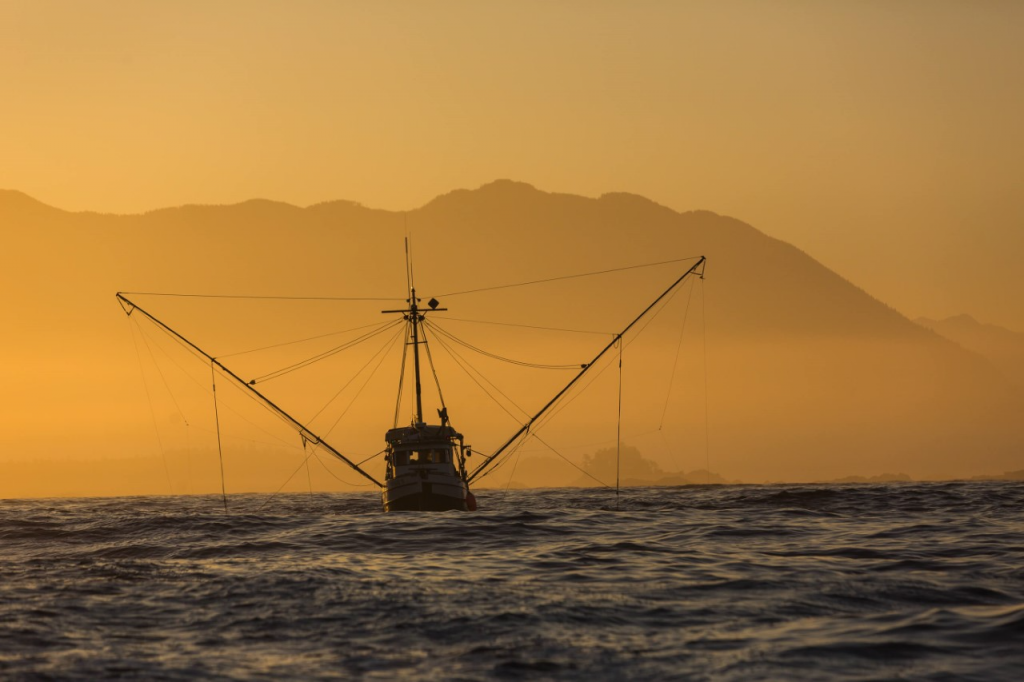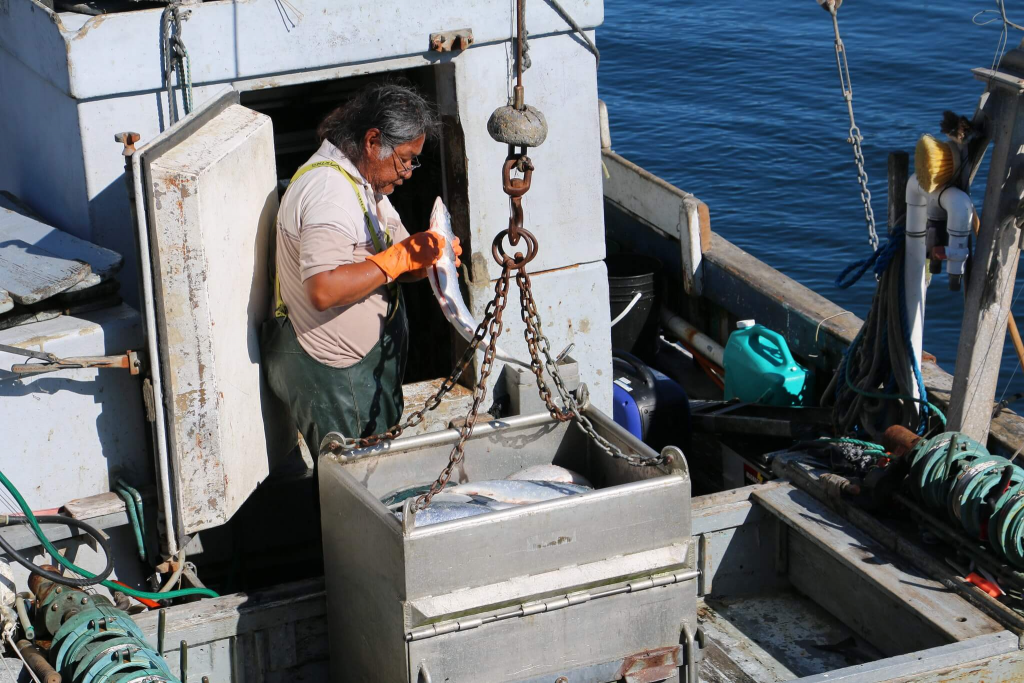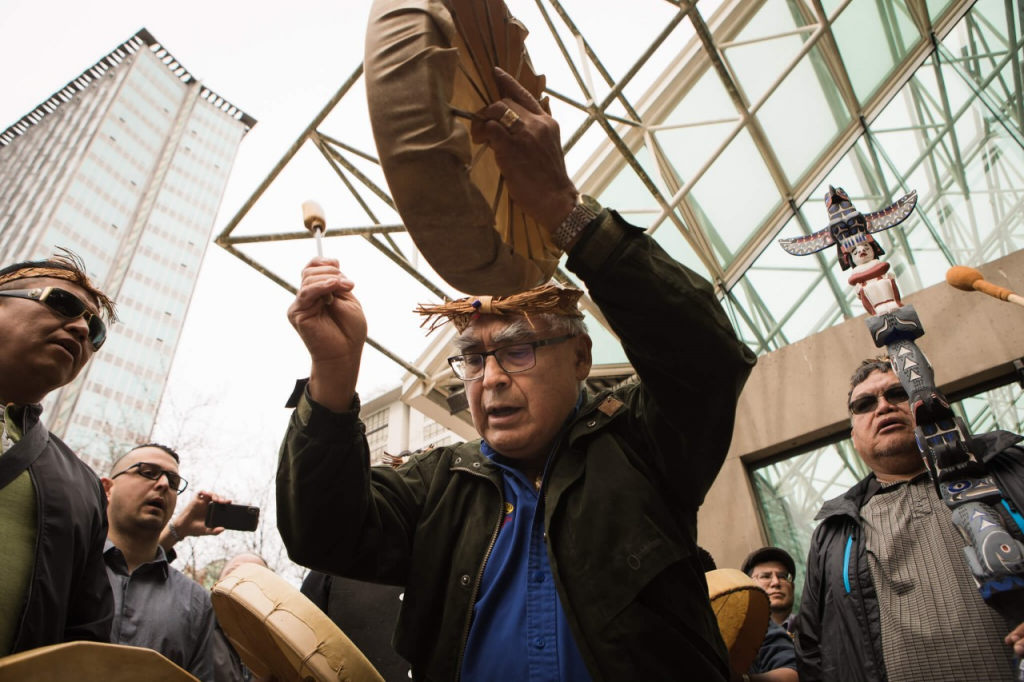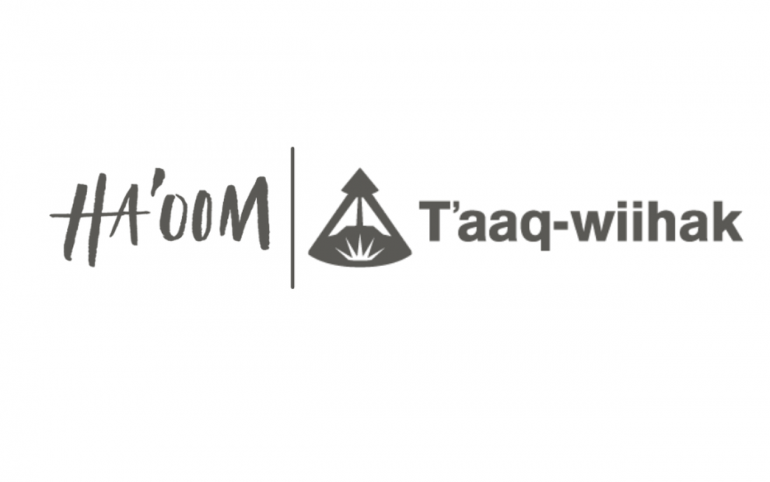August 5, 2021 – The Five Nuu-chah-nulth First Nations of Ahousaht, Hesquiaht, Ehattesaht/Chinehkint, Mowachaht/Muchalaht, and Tla-o-qui-aht will no longer stand by, as our fishers remain tied to our docks, while non-Indigenous users benefit from the resources of our traditional territories. On August 4, 2021, our Ha’wiih (hereditary leadership of our five Nations) issued a declaration to authorize our designated Five Nations’ members to exercise their court-affirmed fishing right to harvest in line with allocations as set out in our fisheries plans.
This fishing season, after 18 drawn-out years of litigation with Canada has finally ended, our Five Nations’ members must have the opportunities that our court-affirmed constitutional right to fish and sell fish confirms: that our people have the ability to participate in viable and sustainable fisheries, guided by the principles of isaak (respect with caring), hishukish t’sawalk (we are all one), our Indigenous knowledge, and conservation. Our right is second only to conservation and has priority over the recreational and commercial sectors. As the BC Court of Appeal recognized, fishing is of “great economic importance” to our communities – past and future.
Hasheukumiss, Richard George, Ahousaht First Nation Ha’wilth (Hereditary Chief) stated: “I have been continually shocked with the various allocations of fish species that the federal government has deemed appropriate. We have the inherent right to fish and sell fish in our traditional territories. The DFO and the rest of Canada need to understand that our traditional territories, and the resources within, are ours to manage. Everything within our waterways is 100% ours, and it is our right to continue our fishery. We are willing to share 50% of our resources with the other user groups, but at the end of the day, the resources are ours to manage through our own conservation practices. We’re fighting for these resources so that our next seven generations will be able to participate in fisheries into the future.”
Despite almost 12 years passing since the court first declared our constitutional fishing right, our Five Nations are still on the margins of the commercial fisheries that take place within our traditional territories. For more than a decade, we have tried to work collaboratively with the Department of Fisheries and Oceans (DFO) to develop fisheries in line with our proven rights. At this point, Canada is not showing us the commitment or effort required to reach a collaborative solution.
In spite of the Government of Canada claiming to support the United Declaration on the Rights of Indigenous Peoples and to respect section 35(1) of the Canadian Constitution, the federal government continues to minimize our fishing rights and denies our members opportunities that would allow them a dignified and meaningful role in the critical fisheries in our waters. If these opportunities are not forthcoming from DFO, then the Ha’wiih must act to uphold our rights, our laws, and our place in the fisheries in our ha-ha-houlthee (traditional territories).
“From the beginning, we’ve been willing to share – that was our approach right from day one. Then, when the Canadian government wouldn’t engage with us, we took them to court and we won, again and again. The court system acknowledges our inherit right, albeit clumsily, and continues to rule in our favour based on the strength of our evidence. Fishing is at the center of Nuu-chah-nulth’s pre-contact activities, our way of life, and our cultural practices. We are a fishing people. By failing to breathe life into our negotiation agreements, the Government of Canada is pushing us to exercise what our Ha’wiih have the authority to do. We’re creating our own fisheries management plans within the framework of conservation, and we will enact them within our traditional territories,” said Wickaninnish, Cliff Atleo, lead negotiator for Ahousaht First Nation.
Our history is dependent on the fisheries. For millennia, our Nations built our societies, cultures, and economies based on harvesting, consuming, trading, using, and benefitting from the abundant fisheries in our territories. We thrived as fishing people. The Crown recognized our skill as fishers when first colonizing our territories and commercial fisheries of British Columbia were built on the labour and knowledge of First Nations fishers. When Canadian policies made fishing a more concentrated, cash-intensive undertaking, we almost lost our place in the fisheries of the West Coast of Vancouver Island. But we did not sit back. We went to court to save our fishing culture and economy. Our ha-ha-houlthee have never been ceded to the Canadian government.
Kekinusuqs, Dr. Judith Sayers, Nuu-chah-nulth Tribal Council President stated: “Our 5 Nuu-chah-nulth Nations demand reconciliation and recognition of their rights as affirmed in the constitution and declared by the Courts. They can not wait any longer for Canada to work with them on fishing plans and will be fishing under the authority of their Ha’wiih and asserting their rights as they have done since time immemorial. It is what must be happen since Canada continually leaves them out of the commercial fishery to the detriment of our fishers while favouring those that only have a privilege to fish. We have fought hard through the courts and politically and now it is time to act on their rights and participate fully in economics that will support their families as they rightfully should.”
The BC Court of Appeal affirmed that our Nations are entitled to allocations that will allow the exercise of our right. Viability is an essential measure of whether our right is being respected. In order to work toward allocations that accommodate our right, we must be able to fish to demonstrate that we need and can harvest the species in our territories. We have considered the level of participation this year, the fisheries available, and the economics – and it is clear that more fish are required for viable opportunities that support our members and the exercise of our constitutional right. Our fishers need, want, and are entitled to more fish.
Photos:



- Wickaninnish, Cliff Atleo, plays the drum while singing the Nuu-chah-nulth song on the court steps in Vancouver, April 2018. Photo credit: Melody Charlie
- Commercial Fishing Boat as a part of the T’aaq-wiihak Fishery, 2016. Photo credit: Melody Charlie
- T’aaq-wiihak Fraser Miʔaat (Sockeye) Landing, August 2018. Photo credit: Irine Polyzogopoulos



